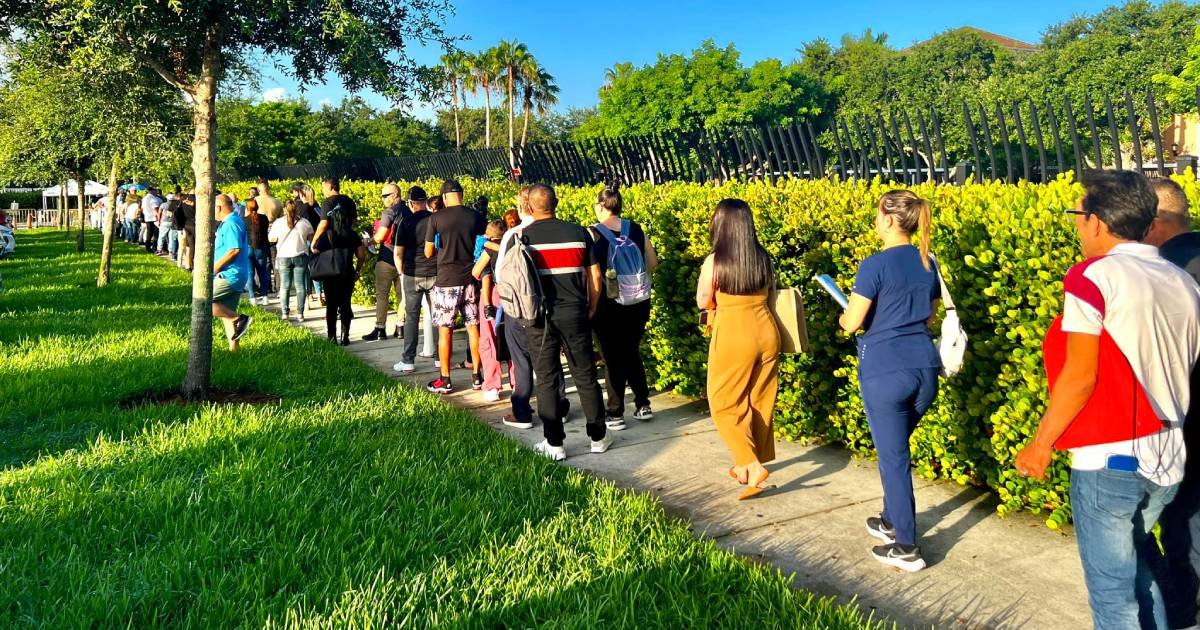Dozens of Cuban nationals lined up this Tuesday to attend their appointments with the U.S. Immigration and Customs Enforcement (ICE) in Miramar, Broward County, reported journalist Javier Díaz. On his Facebook page, the Miami-based reporter posted images of long lines at the immigration office—many holding I-220B documents—risking detention and deportation.
"When you think you're having a bad day, remember this photo: these are migrants, mostly Cubans, who have an appointment with ICE and, after crossing this barrier, risk being detained and deported," Díaz expressed. He noted that the image was taken in the morning at the ICE office in Miramar. "It was filled with Cubans complying with an order to present themselves before immigration authorities. They attended nervously, with the utmost faith and hope that they would not be arrested," he emphasized.
He lamented that "from one day to the next, the lives of those without legal status in the United States can change" and advised migrants to work on their cases and seek ways to legalize their status. In recent weeks, immigration lawyers in Miami have denounced that U.S. authorities are detaining and deporting those with I-220B documents (order of deportation), particularly young individuals without criminal records who must first be accepted by the Cuban regime.
Last Friday, the U.S. deported a group of 54 irregular migrants to Cuba on a flight that landed at José Martí International Airport. According to the Ministry of the Interior (MININT), the group consisted of 40 men and 14 women, most of whom had left Cuba legally but then joined irregular routes to reach the U.S. border.
Among the group was Cuban Mario de León Díaz, who was released the day before with an I-220B document after being detained by ICE and facing the threat of deportation to Cuba. The family's lawyer, Eduardo Soto, filed a lawsuit requesting an emergency parole, arguing the delicate situation of the young migrant's pregnant wife.
León Díaz faced a deportation order for having an I-220B document and for failing to pass the credible fear interview at the U.S. border. During what appeared to be a routine appointment with ICE last week, he was detained for having a Supervision and Deportation Order (I-220B). This has happened to dozens of Cubans who have been sent back to the island on at least seven deportation flights this year.
Understanding the Challenges Faced by Cuban Migrants with ICE Appointments
To better comprehend the difficulties Cuban migrants face during their ICE appointments, here are some frequently asked questions and their answers.
What is an I-220B document?
An I-220B document is an order of supervision and deportation issued by U.S. Immigration and Customs Enforcement (ICE). It generally mandates the holder to comply with certain conditions while awaiting deportation.
Why are Cuban migrants at risk of being detained during ICE appointments?
Cuban migrants with I-220B documents or those who have not passed credible fear interviews are at risk of being detained and deported during their ICE appointments. The current U.S. administration has increased enforcement measures, particularly targeting individuals without legal status.
What steps can migrants take to avoid deportation?
Migrants are advised to work closely with immigration lawyers to explore legal avenues to regularize their status. This may include applying for asylum, seeking emergency parole, or other legal remedies depending on individual circumstances.
